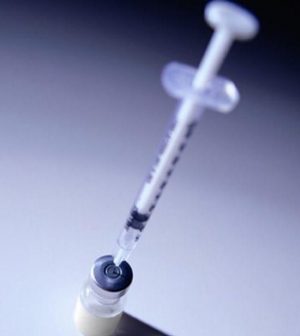- Recognizing the Signs of Hypothyroidism
- 10 Strategies to Overcome Insomnia
- Could Artificial Sweeteners Be Aging the Brain Faster?
- Techniques for Soothing Your Nervous System
- Does the Water in Your House Smell Funny? Here’s Why
- Can a Daily Dose of Apple Cider Vinegar Actually Aid Weight Loss?
- 6 Health Beverages That Can Actually Spike Your Blood Sugar
- Treatment Options for Social Anxiety Disorder
- Understanding the Connection Between Anxiety and Depression
- How Daily Prunes Can Influence Cholesterol and Inflammation
NIH Starts Trial Assessing ‘Mix & Match’ COVID Vaccine Approach

Moderna plus Pfizer? J&J plus Moderna? There’s a new clinical trial underway to assess the safety and effectiveness of mixing different types of booster shots in adults who have been fully vaccinated against COVID-19.
“Although the vaccines currently authorized by the U.S. Food and Drug Administration offer strong protection against COVID-19, we need to prepare for the possibility of needing booster shots to counter waning immunity and to keep pace with an evolving virus,” said Dr. Anthony Fauci, director of the National Institute of Allergy and Infectious Diseases (NIAID), which is part of the U.S. National Institutes of Health (NIH). NIAID is leading the trial.
“The results of this trial are intended to inform public health policy decisions on the potential use of mixed vaccine schedules should booster doses be indicated,” Fauci added in an NIH news release.
The trial will include about 150 people who’ve already received one of three COVID-19 vaccines approved for use in the United States — Johnson & Johnson, Moderna or Pfizer-BioNTech.
Each of three groups will include about 25 people between 18 and 55 years of age and about 25 who are older. Twelve to 20 weeks after completing their initial vaccination regimen, participants will receive a single booster dose of the Moderna vaccine.
People who have not yet received a COVID vaccine are eligible to enroll in a separate trial group. Initially, they will receive the two-dose Moderna vaccine and then get a booster dose of a vaccine about 12 to 20 weeks later.
The volunteers will be followed for one year after their booster shot. They will be asked to complete telephone check-ins and in-person follow-up visits, and to provide periodic blood samples to help researchers evaluate immune responses against current and emerging variants of SARS-CoV-2, the virus that causes COVID-19.
If participants develop confirmed COVID-19 with symptoms, their samples will be tested to determine if their infection was caused by a variant strain of the virus.
Initial findings are expected in late summer 2021, according to the NIH.
Dr. Robert Atmar of Baylor College of Medicine in Houston and Dr. Kirsten Lyke of the University of Maryland are leading the study.
More information
For a list of enrollment locations for this vaccine trial, visit Clinicaltrials.gov.
SOURCE: U.S. National Institutes of Health, news release, June 1, 2021
Source: HealthDay
Copyright © 2026 HealthDay. All rights reserved.










